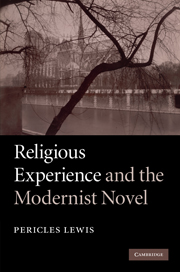Book contents
- Frontmatter
- Contents
- Acknowledgments
- 1 Churchgoing
- 2 God's afterlife
- 3 Henry James and the varieties of religious experience
- 4 Marcel Proust and the elementary forms of religious life
- 5 Franz Kafka and the hermeneutics of suspicion
- 6 Virginia Woolf and the disenchantment of the world
- 7 The burial of the dead
- Notes
- Select bibliography
- Index
2 - God's afterlife
Published online by Cambridge University Press: 26 February 2010
- Frontmatter
- Contents
- Acknowledgments
- 1 Churchgoing
- 2 God's afterlife
- 3 Henry James and the varieties of religious experience
- 4 Marcel Proust and the elementary forms of religious life
- 5 Franz Kafka and the hermeneutics of suspicion
- 6 Virginia Woolf and the disenchantment of the world
- 7 The burial of the dead
- Notes
- Select bibliography
- Index
Summary
Theories of the novel have tended to emphasize the process of secularization. The most common narrative describes the rejection of earlier, religious narrative forms (especially the epic, but sometimes the saint's life or the spiritual autobiography), in which events fall under the sway of supernatural forces, such as gods and monsters, in favor of naturalistic techniques of description and subject matter from the empirically observable world. Versions of this story appear in the works of Walter Benjamin, Erich Auerbach, Mikhail Bakhtin, and Ian Watt, but the most succinct account appears in Georg Lukács's classic study The Theory of the Novel (1916), which describes the novel as “the epic of a world that has been abandoned by God.” Lukács's interpretation has contributed to the secularist assumptions of many influential recent studies of the European novel, from Fredric Jameson's The Political Unconscious (1981) to Franco Moretti's Modern Epic (1994). The received view relies on a much broader historical narrative, which I will call the “secularization thesis”; the secularization thesis characterizes the emergence of modernity as the result of increasingly rational modes of thought and a rejection of belief in the supernatural. Alluding to Friedrich Schiller, Max Weber called this process “the disenchantment of the world.”
If the novel is indeed the characteristic art form of secularization, in Lukács's words, “the representative art-form of our age,” and if modernity is indeed a secular age, we might expect the modernist novel to be doubly secular.
- Type
- Chapter
- Information
- Religious Experience and the Modernist Novel , pp. 23 - 51Publisher: Cambridge University PressPrint publication year: 2010

